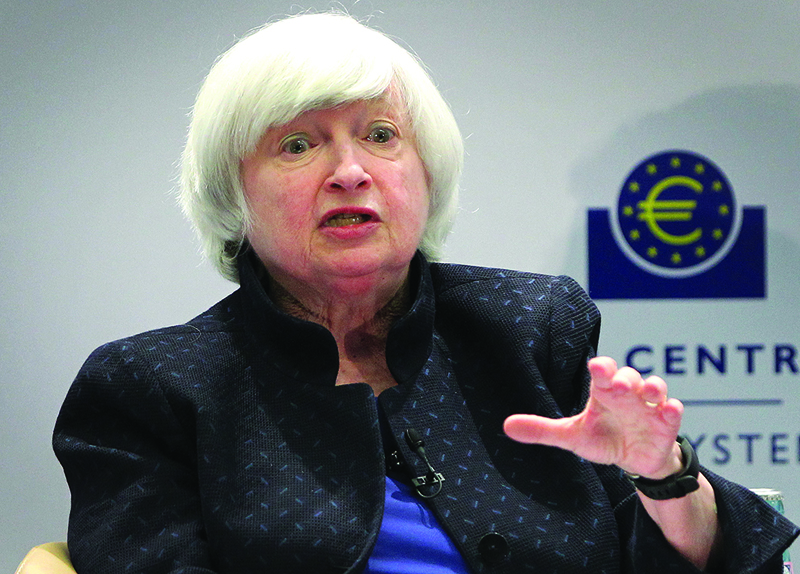
FRANKFURT: The prospect of former Federal Reserve boss Janet Yellen becoming the next US Treasury Secretary is "good news" for the US and the world, ECB vice president Luis de Guindos said yesterday. Yellen's nomination by US President-elect Joe Biden, which needs to be confirmed by the Senate, would make her the first woman in the job.
The 74-year-old would face the daunting task of steering the world's largest economy through the COVID-19 crisis and is seen by experts as favorable to more government spending to provide the necessary support. The ECB itself has unleashed unprecedented stimulus to shore up the eurozone economy and regularly urges governments to support its efforts through more spending.
"What I can say for a personal standpoint is that Janet Yellen knows perfectly what the US economy needs," de Guindos said at a press conference on the ECB's latest financial stability report. Yellen did "a very good job when she was the head of the Federal Reserve," he said, adding that her appointment "is good news for the US economy and for the world economy". Yellen broke barriers when former president Barack Obama nominated her to serve as Fed chair in 2014, a position President Donald Trump ousted her from four years later.
At the Fed, Yellen was seen as a "dove" inclined towards low interest rates to support employment. She would succeed Steven Mnuchin and likely be faced with breaking a months-long deadlock in Congress over passing a new stimulus spending bill for the US economy-assuming lawmakers do not act before Biden's inauguration in January. News of Yellen's appointment has boosted Wall Street stocks this week.
Yellen is a known quantity on financial markets and "has been favorable to the idea of fiscal stimulus," Gregori Volokhine of Meeschaert Financial Services said on Monday. The European Central Bank warned yesterday that a premature withdrawal of government support to the eurozone's pandemic-hit economies could derail the recovery and trigger a wave of bankruptcies.
An "abrupt" end to the measures could "result in a more severe economic contraction than during the first wave of the pandemic," the ECB said in its twice-yearly financial stability report. Eurozone governments have taken unprecedented steps to shield companies and workers from the pandemic fallout, including through guarantees on bank loans and repayment moratoriums, massive short-time working schemes and aid for businesses hit by shutdowns. Despite recent optimism about Covid-19 vaccines, "there is a long road ahead," ECB vice president Luis de Guindos said in a statement.
"Authorities will have to make difficult decisions on whether and how to extend policy measures and, eventually, deal with the debt they create," he said. If fiscal support is not maintained for the full length of the crisis, firms most affected by social distancing restrictions "may face severe solvency issues or a more permanent disruption to their business models", even as other sections of the economy recover, according to the ECB report.
Concerns over a slew of bankruptcies are already high due to the levels of debt incurred by companies and households during the first wave of the pandemic. ECB President Christine Lagarde has previously said her biggest concern was governments creating a "cliff effect" by taking away fiscal support before a full-fledged recovery was under way.
However, while government support schemes continue to be essential, they should "remain targeted towards pandemic-related economic support and avoid giving rise to debt sustainability concerns in the medium term," De Guindos said. The ECB has said that its own pandemic stimulus package, which includes a 1.35-trillion-euro emergency bond-buying scheme ($1.6 trillion) to help keep credit flowing, will continue until the "crisis phase is over".
In the previous edition of its report in May, the Frankfurt-based institution said the risk of the eurozone collapsing could re-emerge as public debt in some countries explodes to cope with the coronavirus shock. Lagarde at the time however said she was "not overly concerned", and the risk is no longer mentioned in the latest report despite EU leaders bickering over a 750-billion-euro recovery plan agreed in July. Lagarde last week called for the Next Generation EU fund to become available "without delay". - AFP











